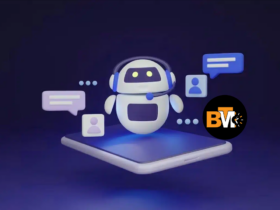The complicated world of AI gets easier to understand with so much progression and news coverage. As AI tools continue to gather data and perfect how to properly gauge realistic and proper human behavior, they continue to fuel and drive creative growth, particularly in the gaming industry.
With the thirst for creative video games and iGaming only continuing to grow, the leading game developers, like PlayStation, continue to rely on AI to inspire and enhance today’s generation of gaming. Discover the incredible and flourishing relationship between AI tools and the gaming and iGaming industries in this article.
The Rise of AI in Gaming Creation
The introduction of AI technology into game development is reshaping game design, construction processes, and player experiences. Generative AI tools enable the automatic production of game assets ranging from visual details to dialogue and gameplay mechanics, accelerating the development process and expanding creative opportunities.
Microsoft’s Muse AI models learn to generate visuals and predict controller inputs from gameplay footage, which allows developers to prototype game scenarios rapidly and preserve the legacy and greatness of classic games by adapting them to modern hardware.
For content creators, deadlines, bugs, and setbacks have been massive problems in the past. Too many setbacks and unresolved bugs often totally derail a game and the company. With AI tools involved, it can greatly aid in weeding out and detecting bugs in real time while fast-tracking the next gaming masterpieces.
Here are some of the compelling reasons why game developers should consider merging AI in their gaming operations:
1. More Realism with NPCs and the Storyline
In years past, playing arcade games and the early video game consoles, the non-playable characters were a joke and ridiculously easy to handle. Even many of the early game bosses were formulaic in how they tried to defeat the controllable characters.
This is because the early non-playable characters in traditional games use fixed scripts, which result in predictable player interactions. Through machine learning, AI-powered NPCs produce more realistic and variable behaviors. AI-driven NPCs gather information from player decisions to react in real-time while forming distinct personalities, which enhance narrative depth and improve game replayability. The new and improved NPCs can even adapt and remember your game style, even if you reset the game.
With most games, players can choose different skill levels. However, AI tools can detect that the game isn’t challenging enough and dynamically raise the difficulty level to keep players on their toes.
Because today’s games are highly interactive, players’ decisions can greatly dictate and alter the story. With so many decisions available, gaming developers rely heavily on AI tools to keep and direct the correct storyline to a logical conclusion based on the character’s decisions.
2. Enhanced Game Level Creation
Game developers have been utilizing procedural content generation to produce expansive and diverse environments and assets while requiring minimal manual effort for many years. Current AI-enabled PCG extends its capabilities through deep learning and generative algorithms, which both automate content creation and enable dynamic adaptation to player behavior.
The standard approach to procedural content generation relies on fixed algorithms, including Perlin noise, to generate random elements. AI-powered models trained on extensive datasets enhance conventional methods by generating environments that adjust dynamically according to player interactions. The outcome is game environments that develop distinct features during each individual playthrough.
The use of AI-powered PCG to automatically create levels and characters as well as generate narratives leads to reduced development time and costs. AI-powered Procedural Content Generation enables developers to concentrate on developing gameplay mechanics like with today’s high-performing Game.
3. More Emotional Realism and Human-like Voices
Games now offer richer interactive and emotional responses thanks to new AI voice and emotion recognition technologies. Through AI-driven recognition systems, games now modify gameplay elements based on players’ voice commands, facial expressions, and detected emotions. Players can participate in more profound role-playing adventures and richer storytelling experiences through this capability.
Examples of Creating AI Gaming Concepts
Today, there’s no stone left unturned with AI and the gaming industries. We explore some of the fantastic examples of the growth of AI-powered gaming.
1. Better Vibe Coding
The emerging field of vibe coding in game development uses AI to quickly prototype and modify game concepts by analyzing player interactions and responses. AI-assisted vibe coding tests, if need be, the game mechanics in real-time, especially with UX gaming for smooth gaming experiences.
2. AI-Powered Storylines
Games now use AI to create storytelling that changes as players make decisions through real-time adaptive narratives. The AI system generates various story outcomes depending on player decisions, meaning each game session offers a distinct experience.
AI-designed conversations adjust responsively to players’ decisions and emotional signals to produce authentic interactions to keep players coming back for new endings and emotional highs.
3. Player Involvement in the Development
Large AI-Language Models, like Evolutionary Engines, support feedback and input from the gamers themselves. Through surveys and behavioral AI tools, these language models catalog the kind of games that players prefer to play and mimic those features and designs.
Conclusion
The ongoing progression of AI technology will make gaming experiences more immersive and intelligent as time progresses. The advent of AI-driven game masters and fully adaptive game worlds, together with hyper-personalized experiences, represents only the starting point for future developments. Developers will persist in investigating AI capabilities, which will result in pioneering breakthroughs that expand the limits of interactive entertainment.
AI technology has moved beyond improvement to fundamentally transform the gaming landscape. The combination of AI tools with game design enables developers to deliver unique experiences that change dynamically in real-time and offer players enhanced engagement with limitless possibilities within fully immersive worlds.







Leave a Reply